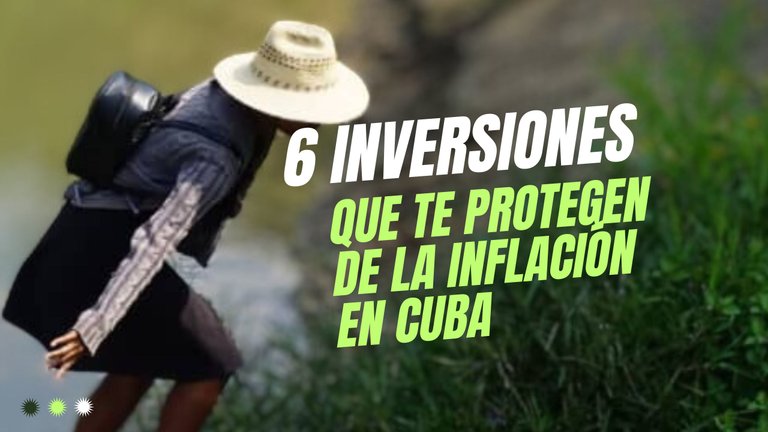6 investments that protect against inflation in Cuba (ESP-ENG)

La fábrica de turrones que solía abastecer a mi negocio ahora se enfrenta a la subida del precio de su materia prima esencial: el maní. Esto ha elevado el coste de producción y el precio final. Como consecuencia, ha disminuido la clientela, ya que muchos consumidores no pueden pagar más debido a la crisis alimentaria que atraviesa el país.
The nougat factory that used to supply my business is now facing a rise in the price of its essential raw material: peanuts. This has increased production costs and the final price. As a consequence, the clientele has decreased, since many consumers cannot afford to pay more due to the food crisis the country is going through.
Esta situación ha provocado una gran incertidumbre entre quienes dependemos de la fábrica para abastecernos. Antes invertíamos con tranquilidad, pero ahora debemos revisar constantemente nuestro presupuesto para ajustarlo a los nuevos precios. La moneda nacional no tiene prácticamente valor y es con la que opero, pues aunque pague más por cada turrón, las ganancias no cubren mi inversión. La inflación afecta a mi economía personal y a la de mi negocio, pero también influye en la calidad y la productividad de la fábrica. Algunos clientes han notado que el precio ha aumentado, pero hay menos maní en los turrones. Por el momento, el sabor sigue siendo el mismo. No obstante, si sigue subiendo su precio y baja la calidad que tenía al inicio, disminuirá la demanda.
Estamos soportando las consecuencias de los errores continuos del Gobierno, porque esto ha sucedido tras su desequilibrio económico producto de gastar más de lo que ingresaban. Ninguna economía puede sobrevivir así. La medida que tomaron para enmendar este error empeoró la situación: aumentar la circulación de moneda nacional mediante subidas salariales en plena crisis mundial. Esto solo aumentó la demanda de bienes y servicios, ya que el Estado no tiene una oferta proporcional para tanta cantidad de dinero. El resultado fue que las personas en la calle tenían más dólares para vender que el propio Gobierno, lo que infló aún más los precios y nos encontramos actualmente en un ciclo inflacionario del que se desconoce cuándo se detendrá.
Si alguien me preguntara si había otras medidas que tomar para evitar seguir gastando más de lo que se ganaba, mi opinión es que sí. Cuba ingresaba por aquel entonces más de miles de millones de dólares anuales, gracias a misiones médicas, turismo, brigadas de educadores, exportaciones y servicios menores. Con esa elevada cifra en dólares, hay que saber reordenar las prioridades e invertir en sectores clave de la economía nacional, y no me refiero a poner más dinero en el turismo. Hay que cambiar de mentalidad y dejar de creer que el turismo es la clave para salvar la economía cubana, como les gusta decir a los ministros. Nuestras grandes riquezas yacen en la tierra y, mientras no les exijamos al gobierno a centrar su inversión en ese sector, que es nuestra mayor fortaleza, veo muy difícil que podamos salir definitivamente de la crisis a la que nos han llevado.
En estos tiempos de inflación, los emprendedores deben evitar planificar a largo plazo, pues la economía es inestable. Unos días el producto tiene un precio, pero al cabo de los tres días ya puede haber aumentado. Los cubanos que quieran emprender aún así, porque indudablemente lo necesitan, deberían considerar estas seis opciones:
Talleres de reparación de teléfonos móviles, electrodomésticos, bicicletas o coches, porque la demanda de mantenimiento es alta.
Clínicas privadas, ya que no son ninguna novedad y ofrecen rapidez y calidad que el sector público no siempre garantiza.
Clases particulares de idiomas, capacitaciones profesionales o clases de repaso, que mantienen una alta demanda incluso con inflación.
Casas de cuidado infantil particulares, que cobran incluso en divisas en algunos lugares.
Venta de productos agropecuarios, especialmente si provienen de tu tierra, lo que te protege de la inflación.
Guía turístico local para quienes dominen el idioma y quieran cobrar en moneda extranjera.
En fin, los emprendedores cubanos debemos buscar alternativas para proteger nuestra economía en sectores con demanda estable, donde se puedan ajustar los precios rápidamente o manejar ingresos en divisas. Así podremos hacer que nuestro negocio sea sostenible.

The nougat factory that used to supply my business is now facing a rise in the price of its essential raw material: peanuts. This has increased production costs and the final price. As a consequence, the clientele has decreased, since many consumers cannot afford to pay more due to the food crisis the country is going through.
This situation has caused great uncertainty among those of us who depend on the factory for supply. We used to invest with peace of mind, but now we must constantly review our budget to adjust it to the new prices. The national currency has practically no value, and it is the one I operate with; although I pay more for each nougat, the profits do not cover my investment. Inflation affects my personal economy and that of my business, but it also influences the quality and productivity of the factory. Some customers have noticed that the price has increased, but there is less peanut in the nougats. For now, the flavor remains the same. However, if the price continues to rise and the quality decreases from what it was initially, demand will drop.
We are bearing the consequences of the Government’s continuous mistakes, because this situation arose after their economic imbalance caused by spending more than they earned. No economy can survive like that. The measure they took to fix this mistake worsened the situation: increasing the circulation of the national currency through salary raises in the middle of a global crisis. This only raised the demand for goods and services, since the State does not have a proportional supply for such an amount of money. The result was that people on the street had more dollars to sell than the Government itself, which further inflated prices, and we currently find ourselves in an inflationary cycle with no clear end in sight.
If someone asked me if there were other measures to avoid spending more than was earned, my opinion is yes. At that time, Cuba earned more than billions of dollars annually thanks to medical missions, tourism, educator brigades, exports, and minor services. With that large amount of money, it is necessary to reorder priorities and invest in key sectors of the national economy—not by putting more money into tourism. There needs to be a change of mindset and stop believing that tourism is the key to saving the Cuban economy, as ministers like to say. Our great wealth lies in the land, and as long as we do not demand the government to focus its investment on that sector, which is our greatest strength, I find it very difficult that we can definitively get out of the crisis they have led us into.
In these times of inflation, entrepreneurs should avoid long-term planning because the economy is unstable. One day a product has a price, but after three days it may have increased. Cubans who want to start businesses anyway, because they undoubtedly need to, should consider these six options:
Repair workshops for mobile phones, appliances, bicycles, or cars, because the demand for maintenance is high.
Private clinics, as they are not new and offer speed and quality that the public sector does not always guarantee.
Private language classes, professional training, or tutoring, which maintain high demand even with inflation.
Private childcare homes, which in some places even charge in foreign currency.
Sale of agricultural products, especially if they come from your land, which protects you from inflation.
Local tour guide for those who master the language and want to charge in foreign currency.
In short, Cuban entrepreneurs must look for alternatives to protect our economy in sectors with stable demand, where prices can be adjusted quickly or incomes managed in foreign currency. This way, we can make our business sustainable.
Translated with DeepL.com (free version)


Buenas noches @estilodereba. Esto de las economías inestables coloca al emprendedor, literalmente, contra la pared, buscar alternativas es una opción válida, pero el problema de fondo siempre está allí generando una inseguridad que va más allá de lo personal, desde este punto de vista a los emprendedores lo que nos queda es seguir fortaleciéndonos en la perseverancia, seguir insistiendo y persistiendo. Saludos. 😊
Saludos
@tipu curate 8
Sorry, please curate posts not older than 1 day.
Sorry, please curate posts not older than 1 day.